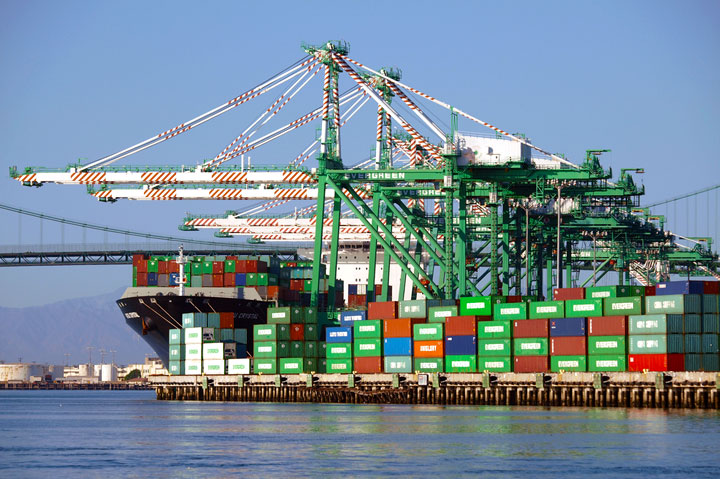October 13, 2021
Import Relief? Port of LA to Operate 24/7
It’s one of the key actions the Biden Administration has announced to help alleviate bottlenecks at ports.
Some relief may be on the way.
The Port of Los Angeles will begin operating around the clock to help alleviate ship and cargo container congestion that has been gumming up supply chains across industries, including the promotional products space.
It’s a centerpiece measure that President Joe Biden’s administration announced Wednesday, Oct. 13, as part of efforts to get imported goods flowing more efficiently through U.S. ports, onto trucks and rail lines, and ultimately into warehouses and stores as the holiday shopping season heats up.

The Port of Long Beach, LA’s sister port, was already operating at 24/7. Now, LA will join Long Beach by adding new off-peak nighttime shifts and weekend hours. “This expansion means the Port of Los Angeles has nearly doubled the hours that cargo will be able to move out of its docks and on highways,” the Biden administration said.
The ports of Long Beach and Los Angeles process about 40% of the imported cargo containers that enter the United States.
Today I’m announcing that the Port of LA will begin operating around the clock 24/7 to make sure Americans can get the goods they need.
— President Biden (@POTUS) October 13, 2021
My Administration is working around the clock to move more goods faster and strengthen the resiliency of our supply chains.
Some critics have noted that, even with expanded port hours, bottlenecks can occur further down the supply chain, such as with domestic carriers.
To help unclog some of those choke points, UPS is committing to an increased use of 24/7 operations and enhanced data sharing with the ports, which could allow it to move up to 20% more containers from the ports.
Similarly, FedEx is committing to work to combine an increase in nighttime hours with changes to trucking and rail use to increase the volume of containers it will move from the ports. “Once these changes are in place, they could double the volume of cargo they can move out of the ports at night,” the Biden administration said.
Mega retailers that import massive quantities of products are also stepping up efforts to help ease pressure on the pivotal SoCal ports.
Walmart, for instance, is committing to increase its use of nighttime hours significantly to move goods, which the retailer says could increase throughput by as much as 50% over the next several weeks.
Meanwhile, The Home Depot plans to move 10% additional containers per week during the newly available off-peak port hours at Los Angeles and Long Beach.
Target already moves about 50% of its containers at night, which leads to quicker processing and transport of goods than what occurs during peak daytime hours. Now, Target plans to move another 10% of containers at night during the next 90 days to help alleviate some of the logjam.
Additionally, Samsung is committing to move nearly 60% more containers out of these ports by operating 24/7 through the next 90 days. Nearly three-quarters (72%) of U.S. homes have at least one Samsung product, from appliances to consumer electronics.
Data Shows 12 Million Metric Tons of Goods Offshore at SoCal Ports https://t.co/nk2mAWUBi7
— Chris Ruvo (@ChrisR_ASI) October 11, 2021
“Across these six companies, over 3,500 additional containers per week will move at night through the end of the year,” the Biden administration said.
Biden was scheduled to meet Wednesday, Oct. 13, with business leaders, port leaders and union leaders to discuss the challenges at ports across the country, and actions each partner can take to address the delays and congestion across the transportation supply chain.
In June, Biden launched the Supply Chain Disruptions Task Force to focus on transportation and logistics bottlenecks to the U.S. economic recovery. After meeting with local government leaders and companies to diagnose the problems and identify solutions, Port Envoy John Porcari was appointed in August to help drive coordination between the private firms who control the transportation and logistics supply chain.
So far, however, the crush on ports and stress on logistics providers has remained at fever pitch. In the promotional products industry, the port congestion has combined with a plethora of other factors to lead to inventory shortfalls, as suppliers have been unable to replenish stock – a problem contributed to by strong end-buyer demand.
All the issues are tied to fallout from the COVID-19 pandemic.
